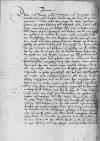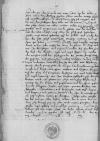Wyr haben von wegen der itzigen geferlichen getzeiten / zw gutter sicherung und underhalt unser ⌊lande⌋ und ⌊leuthe⌋ / notwendig zw sein bedacht / alle unser underthan vom adel, / steten, / freyen, / schultissen und andern, / wo die auch gesessen, / geistlich und weltlich, / die gutter under uns haben / und uns dinstpflichtig sein / mit knechten, / pferden, /
harnasch, / was zum ernst und wehre gehorig, / so hoch ein itzlicher uns zu dienen schuldig, zw gutter rustung und bereitschafft / in diesen gelouften / zw ermanen und fordernn, / derhalben wir dir befelhen, das dir alle die jenigen, / die in deinem ... ampt, / dortzw wir dich gesetzt, / uns mit dinsten vorwant / vor dich sich zw komen / und von unsern wegen thust thue gebietten, / ouch den andern, / wo die mit yhren personen under unsz gesessen wonhafftig, / durch
ihre
scholtzen lossen ankundigen / und ihn von unsert wegen ernstlich anzceigen, / das eyn yden bey vorlust seiner gutter / mit knechten, / pferden, / harnasch wolgerustet in gutter gereitschafft sitze / und sich enthalte, / geschickt uff weitter unser erfordern, / so hoch ein yder uns zw dienenn pflichtig, / auffzusein / und an die orter, dohin er geheischen, / zcw ziehen, / und do weitter unserm geboth und befelh nachzukomen, dabey auch allen unsern ⌊unterthan⌋ vorgemelt, / geistlich und weltlich, / thust ansetzen ansagen, / wie das die heren ⌊konigliche rethe dieser lande⌋ neben uns / nechst zw ⌊Marienburg⌋ in gehaltner ⌊tagfart⌋ uff ansuchen ⌊koniglicher majestet⌋, / unsers allergnedigsten hernn, die solchs diesen yhren ⌊landen⌋ zur bereitschafft / ein kriegrustung uffzubringen, / so es die nott wurde erfurdern, / not durfftig hott geacht, / angesehen / dieser zceit ferliche gelouffte / und des Turcken yn die cristenheit gewaltig eindringen, / zwgesagt und gesatzt haben / mit aller stende eintrechtiger bewilligung / diesen koniglichen landen zw gutt / eure zceise / der gestalt, wie vor vier jaren, / als von einem scheffel malts aus allen milen zcwe schilling / und von ytzlicher tonnen frembdbir, / das baussen, / oder hie im lande von einer stat in die ander gefurt wirt, / drey schilling gegeben sollen werden, / welche zceise uff nechstkunfftigen sancti Bartholomei thag sol angehen, / und bis an den selbigen thag uber ein jor weren. / Damit aber solche zceise / aus allen mulen under uns getrewlich gegeben und eingenomen werde, / gebitte wir dir und den aus der stat rathe ..., / auch allen, die solche zeise zufordern gesetzt, / noch altem gebrauch uff die zceddel und lade, / dar ein das gelt gelegt wirt, / gutte, vleissige achtung und uffsehen zw haben.
Weitter auch wirstu ansagen, domit es ein yder wisse, / das durch die ⌊herren koniglichen rethe⌋ und uns in koniglichen und unsern ⌊landen⌋ / bey hundert gulden busz / das buchsen / wylt und vogel schissen / in welden oder wassern / und den fuszgehenden bey harter straff buchsen zwhaben und gebrauchen / ernstlich verbothen. / Ouch wirstu ... alle unsere ⌊underthan⌋ warnen zuvorwarnen, das sich ein yder mit kleydung seinem stande gemesz halte, / der burger, / handwercksman, / geselle, magdt und knecht / mit yhren weybern und tochtern / burgerlich, / der frey und zinspawer dergleichen / mit weib, tochter, knecht und magdt / pewrlich, / wie ire vorfarn, / gekleydet gehe. / Dan im kurtzen werde wir gebitten, / wo solche unmessige kleyder, / und nemlich bey den freyen und zinspawern / und den yhren, gefunden, / als federhutt, / seyden und schön gewant, / körschen / von kytaycken, / schamlitten / und dergleichen rocke, lappen und kragen / und gebreme darumb, / die ihn zu nemen, / und sie noch unserm willen zu straffen. / Solchs alles wirstu vor dir und yn allen lassen ablesen, / das es einer dem andern sag, / darnoch sich ein yder werde wissen zurichten. / Daran thustu unser gefellig und ernstliche meinung. Das zu urkunt hab wir unser sigel an diesen offnen brieff lassen drucken.

